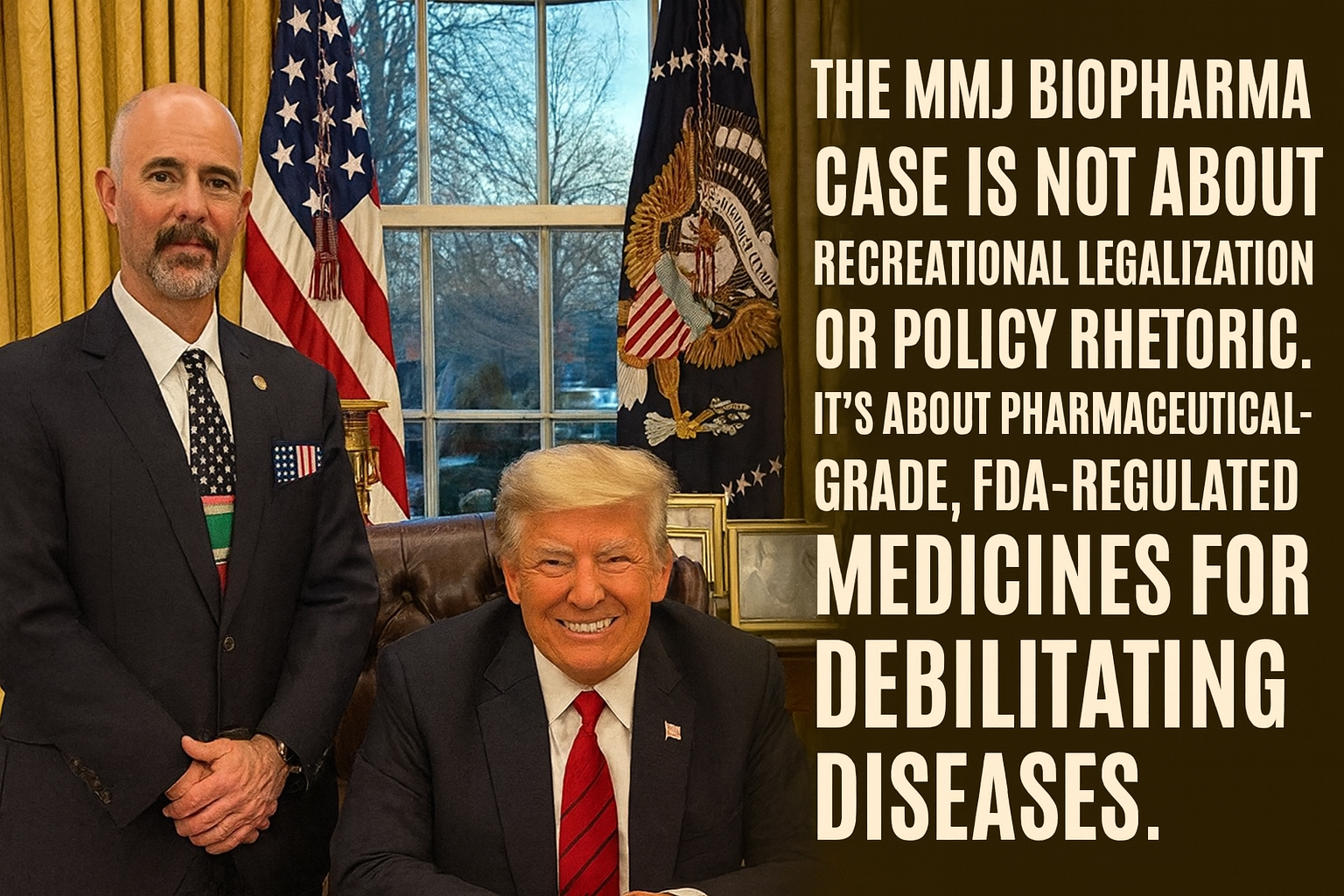Terry Cole's future as DEA Administrator depends on recognizing the difference between cartels trafficking illicit fentanyl and MMJ's BioPharma Cultivation developing FDA sanctioned cannabinoid medicines for neurological diseases.
WASHINGTON, DC / ACCESS Newswire / August 5, 2025 / When President Donald Trump nominated Terrance C. "Terry" Cole to lead the U.S. Drug Enforcement Administration (DEA), it was a clear signal: Cole's primary mission was to dismantle cartels, combat the synthetic opioid crisis, and restore enforcement-first leadership at an agency long mired in political controversy. With a 22-year career at DEA, followed by a successful stint as Virginia's Secretary of Public Safety, Cole embodies the hardened operational mindset of an agency laser-focused on disruption of illicit drug networks.
But now, as DEA Administrator, Cole faces a leadership test that law enforcement experience alone cannot solve: Will he continue the agency's institutional stonewalling of legitimate cannabis pharmaceutical research, or will he embrace scientific integrity and public health necessity by facilitating companies like MMJ BioPharma Cultivation in their quest to bring FDA-approved cannabinoid medicines to patients suffering from Huntington's Disease and Multiple Sclerosis?

Cole's Resume: Enforcement Rigor, but Regulatory Inertia?
Terry Cole's career achievements are unquestionable. He oversaw complex anti-cartel operations in Mexico and Central America, served as DEA's liaison to the National Security Council, and, as Virginia's chief public safety official, led the state to a 44% reduction in overdose deaths in under a year. These are hard data points that speak to Cole's operational success in traditional enforcement.
However, the regulatory side of DEA-particularly its Diversion Control Division-remains deeply flawed. The same bureaucratic apparatus that protected the University of Mississippi's research cannabis monopoly for 50 years has now turned to sabotaging private pharmaceutical developers through endless procedural delays. Cole's predecessors enabled this rot. The question is whether his enforcement first philosophy blinds him to the agency's scientific accountability failures.
Boise's Resume: A Public Health Mission Obstructed by DEA Old Guard
On the other side stands Duane Boise, President & CEO of MMJ International Holdings. A humanitarian entrepreneur with a 30 year track record in healthcare innovation, Boise has achieved milestones that any biotech CEO would envy: FDA Orphan Drug Designation, two active Investigational New Drug (IND) applications, and a DEA-approved Schedule I analytical lab registration.
But despite MMJ's regulatory compliance, the DEA has refused to grant a Bulk Manufacturing Registration, effectively halting clinical trials for plant-derived cannabinoid therapies targeting neurological diseases. For over seven years, MMJ's applications have been entangled in a system designed to protect status quo interests, not scientific progress.
Cole's Enforcement Mindset Needs a Public Health Reality Check
Terry Cole's nomination under Trump was built on a mandate of enforcement and operational disruption. This makes him instinctively cautious-if not resistant-toward cannabis rescheduling debates and broader reform agendas. However, the MMJ BioPharma case is not about recreational legalization or policy rhetoric. It's about pharmaceutical-grade, FDA-regulated medicines for debilitating diseases.
Cole's enforcement instincts must now evolve to recognize a critical distinction:
Illicit drug cartels trafficking fentanyl are the enemy of public safety.
Federally compliant pharmaceutical developers like MMJ BioPharma are allies of public health.
The same laser-focused leadership that Cole used to dismantle cartel networks must now be directed inward-toward rooting out the institutional sabotage within the DEA's own licensing apparatus.
What Cole Must Do-Now
For Cole to succeed as a transformative leader rather than a caretaker of bureaucratic inertia, he must:
Approve MMJ BioPharma's Bulk Manufacturing Registration immediately.
Disband the DEA's internal regulatory traps that have strangled cannabis pharmaceutical research under the guise of "diversion control."
Align DEA policy with the Medical Marijuana and Cannabidiol Research Expansion Act (MCREA), ensuring that qualified applicants receive a fair and timely path to approval.
Hold accountable those within the DEA's licensing division who have weaponized procedural tactics to obstruct science.
The Legacy Crossroads
Terry Cole's enforcement résumé has earned him the credibility to confront America's most dangerous narcotics traffickers. But his legacy will not be defined by how many cartel leaders he pursues; it will be judged by whether he had the vision to modernize the DEA into an agency that can differentiate between criminal enterprises and scientific innovation.
If Cole ignores the compelling evidence presented by MMJ BioPharma-FDA designations, DEA lab registrations, and clinical urgency-he will perpetuate the very regulatory stagnation that has rendered the DEA's cannabis policy a global embarrassment.
But if he acts decisively, Terry Cole has the chance to pivot from enforcement hawk to reformer-a leader who finally corrected the agency's war on science.
The choice is his.
MMJ is represented by attorney Megan Sheehan.
CONTACT:
Madison Hisey
MHisey@mmjih.com
203-231-8583
SOURCE: MMJ International Holdings
View the original press release on ACCESS Newswire:
https://www.accessnewswire.com/newsroom/en/healthcare-and-pharmaceutical/will-dea-cole-dismantle-marijuana-research-blockade-mmj-biopharma-wil-1056448
